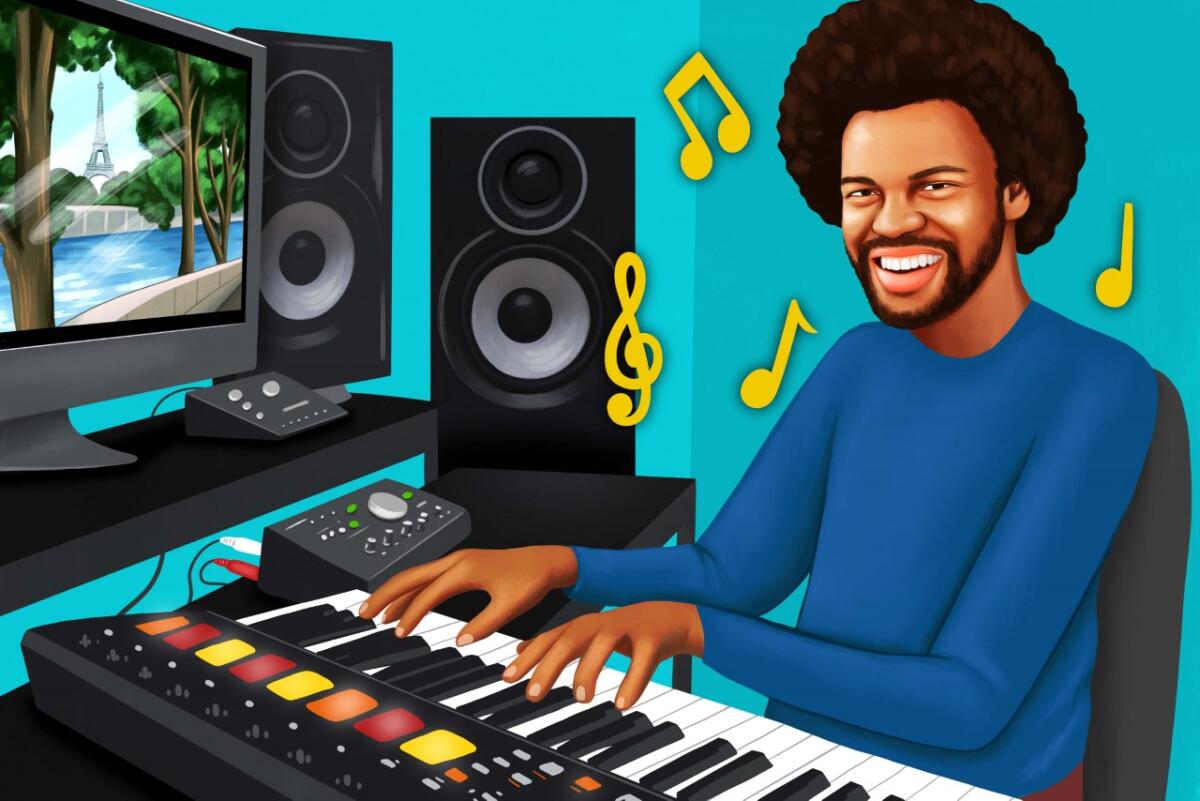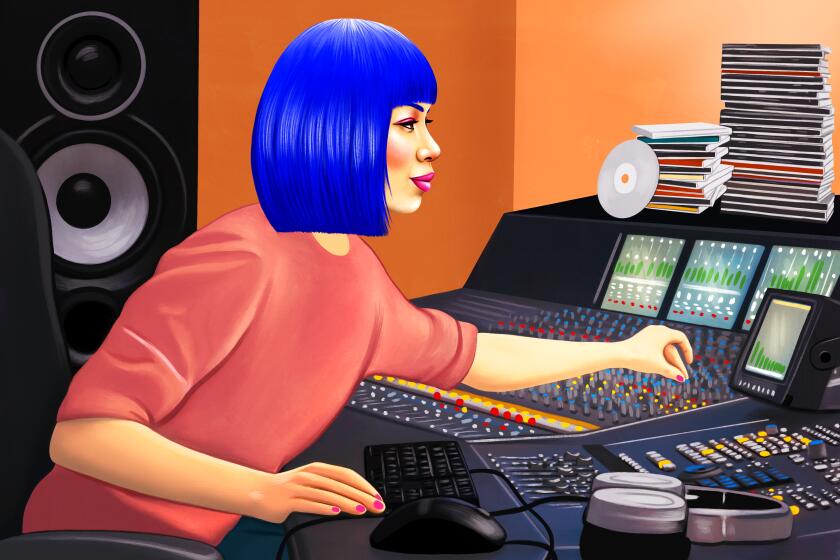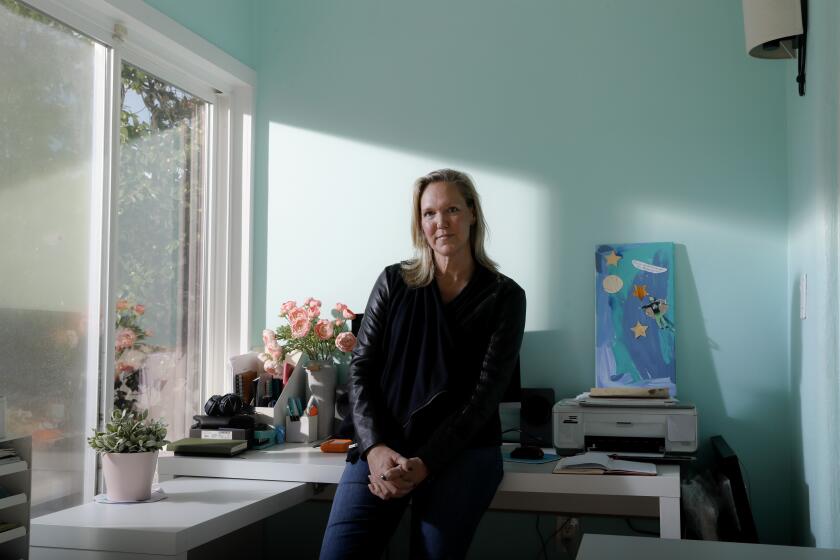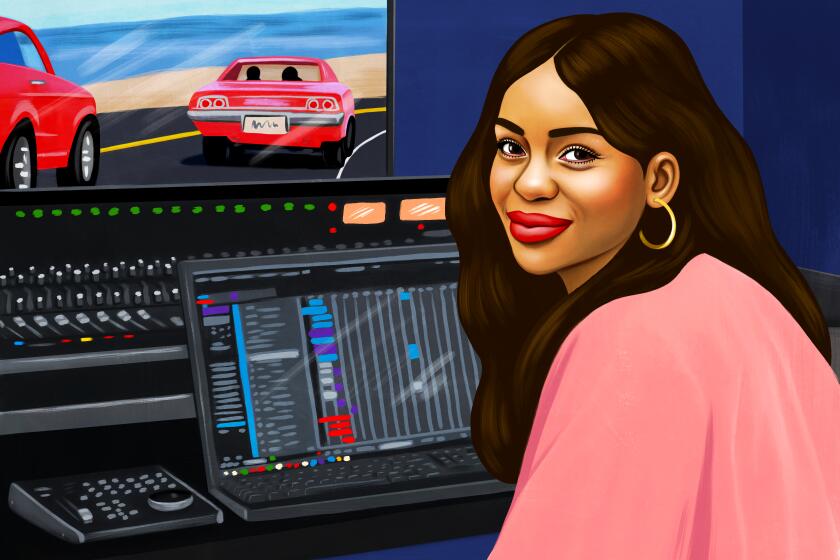Explaining Hollywood: How to become a composer for film and TV

- Share via
For moviegoers of a certain age, there is one musical snippet even more famous than the four opening notes of Beethoven’s Fifth Symphony: the deep, bowed strings that announce the arrival of Bruce, the great white shark in “Jaws.”
Nothing demonstrates the power of a movie or television show’s original music better than composer John Williams’ theme, which cranks up the audience’s anxiety long before the aquatic killing machine breaks the surface. It also shows how directors and composers work together to engage and move audiences on an emotional level.
Most of the time, a score isn’t as palpable a trigger as it is in “Jaws.” It may be working in the background to help set or subtly shift the mood; it may hint that trouble is coming or that problems have, at last, been resolved. The signals the music sends, though, all reflect deliberate choices made by the composer and the rest of the creative team.
Genevieve Vincent, whose credits include “The Broken Hearts Gallery” and the rebooted “Fantasy Island” TV series, says the process starts with the composer “creating a special musical language for the film or TV show with which to articulate the tone.” That language may have to evoke the time and place of the action, as well as the personality traits of the characters.
Zach Robinson, who writes the music for the TV series “Cobra Kai” with his frequent collaborator Leo Birenberg, said composers develop a toolbox of sorts over time, filled with specific chords or instruments that map well to certain cinematic moments. “There’s only so many combinations that you can do,” Robinson said. “As you do this more often, you find the puzzle pieces that fit.”
But a composer does much more for a production than just write music. As the head of the department responsible for the “underscore” — the original music that plays throughout, often in the background — the composer has to record demos of the music proposed for every scene, revise them repeatedly in response to input from the director (among others), then hire musicians, book studio time and oversee the recording of the final version.
So if you’re a musician who loves to help other people tell their stories, and if you’re fluent in both music technology and project management, composing for film or TV may be the job for you. As with seemingly every other job in the entertainment industry, though, it takes years of work to get to the point where you can be a full-time composer.
The Times spoke with eight film and TV composers — Vincent, Robinson, Birenberg, Chanda Dancy, Amie Doherty, Ian Hultquist, Lachi, Stephen Letnes and Michael Yezerski — about the work and how to get started. Here are their insights.
Who becomes a composer for film and TV?
Every pro interviewed for this story grew up studying at least one instrument, likepiano, clarinet, violin or saxophone. Not having training in an instrument, Yezerski said, “sets you back a long way.” But given the advances in music software, he added, “it’s very clear that a laptop or an iPad or even a phone is an instrument. As long as you have a few years under your belt mastering that, you’re probably on your way to being a composer.”
At least half of the composers interviewed also are, or once were, performing musicians — Vincent is in darkDARK, Dancy used to be in Modern Time Machines, Lachi continues to release dance music tracks, and Hultquist was in the indie pop band Passion Pit. Others, though, said they gravitated toward composing because they didn’t like to play live.
It goes without saying that a composer needs to be musically creative and capable of writing in multiple different styles. It will help if you enjoy tinkering with sounds and are curious about instruments and music technology, Vincent said. And it’s a really good thing if you enjoy developing new skills, she added, because the job involves a lot of that.
But you also need to be able to produce on demand, not just when inspiration strikes. As Birenberg put it, good film composers “have trained their creative skills to work like a faucet.”
Doherty said the composer’s work typically begins by joining a “spotting session” with the filmmaker, producers, music supervisor and sound designer to decide where the score should come in for each scene and how prominent it should be. Often the film will have a “temp” score put together by a music editor, which Doherty said she likes to use as starting point for discerning what the director wants.
But most of the work of a composer doesn’t involve, you know, composing. “Writing the actual music is really only about 10% of the job,” said Letnes, whose most recent score is for the documentary “Surpassing Sight.”
Explained Lachi, “You’re also a manager. So you’ve got to manage the budget. For the most part, you are the one bringing in the day players, negotiating the rates, trying to figure out the scheduling. ... There’s just so many moving parts.”
Because of those other duties, Robinson said, you have to be good at managing the workflow — knowing how much time each part of the process is likely to take, then keeping the writing and recording process on schedule.
And like many below-the-line jobs in Hollywood, a composer needs to be extremely collaborative and team-oriented.
“I’m in a service industry,” Vincent said. “I’m in the arts, but I’m making something for someone else.”
“Even the studio heads will come and listen to the score,” said Dancy, whose credits include the music for Sony Pictures’ new film “Devotion.” “Everyone listens, and everyone has an opinion.”
“This job is not writing music,” Birenberg said. “This job is rewriting music. ... If you want to just write music, go write concert music, because that’s not what this stuff is.”
Communication skills are vital, and particularly the ability to understand what a director or showrunner is asking for in a scene. “We often say, ‘What’s the note behind the note?’ What is it that they’re asking for?” Yezerski said.
It also helps to have a thick skin because you’ll get a lot of criticism. But it’s never personal, Dancy said. “It’s literally all about the project.”
A music supervisor combines the skills of a disc jockey and a negotiator to help pull together the soundtrack of a film or TV show.
How do you get started?
Typically, would-be composers make many incremental moves to gain connections, experience and credits.
A common path is to work as an assistant to an in-demand composer, learning every aspect of the workflow. Even then, though, you’ll need to pursue opportunities to write music for smaller projects in your free time.
Robinson and Birenberg, for example, both worked for Christophe Beck, the composer on “Frozen” and a dizzying variety of other film and TV projects. “Working for any type of composer who does projects of that magnitude is the best kind of master class,” Robinson said.
Although film school can be helpful, it “doesn’t teach you anything about all the logistical aspects of doing film music,” Birenberg said. And unless you watch someone writing music to picture again and again, “you’d really be extremely clueless.”
But that’s not the only way in. Dancy, for example, said she decided not to become a composer’s assistant because “it was a lot more of a boys’ club than it is now.” And not just a boys’ club — a white boys’ club.
So for about 10 years, she wrote music for her friends’ student films and short films, then their first features. “It just built from there,” she said, but added, “It took a long, long time.”
To make ends meet, she held jobs at Activision (“I played videogames on the late shift, and I composed music during the day”), at a friend’s sound design company, and at a company that checked films for digital errors. “It was these really low-stakes, cool jobs that didn’t drain my soul.”
Many of the pros said that friends and fellow students from their college networks provided key opportunities to compose scores. “It is kind of a community, and you rise together in a lot of ways,” said Doherty. For example, she met Leah Dennis and Alvin Wee through a Berklee College of Music alumni group soon after they all had moved to Los Angeles. Years later, Dennis was her music editor and Wee her score mixer on the TV series “She-Hulk: Attorney at Law.”
Despite their increasingly important role in curating music for TV shows and movies, music supervisors say they aren’t getting the pay and benefits shared by their unionized peers in Hollywood.
Working on friends’ and fellow students’ films helps composers address what Doherty called a Catch-22: It’s hard to get hired without film credits, but you can’t get credits if you haven’t worked on anything.
There’s also the DIY route.
Letnes, who like Lachi is legally blind, said he wanted to study composition at Concordia College, but “some professors would not teach me because I could not read sheet music.” After initially giving up on the idea of writing film scores, he taught himself the tools of the trade by studying film composers’ YouTube videos. Then he tapped into the network of friends he’d made at Concordia to start lining up jobs as a composer, beginning with young students’ films and gradually working his way up. (Concordia, by the way, honored Letnes last year as a distinguished young alumnus.)
Hultquist said that the amount of good instruction on YouTube has “really kind of exploded” in recent years. As examples, he pointed to the YouTube videos by Spitfire Audio, a company that sells sound libraries, and Dutch composer Tom Holkenborg (also known as Junkie XL). “All that stuff was not quite there when I started,” Hultquist said, “but now, literally, you can learn a ton from YouTube.”
A handful of organizations have launched programs to help new composers find their footing in the industry. All three major performing rights organizations offer or contribute to fellowships: Broadcast Music, Inc., has four, the American Society of Composers, Authors and Publishers Foundation has one and SESAC supports New Music USA’s Reel Change Film Fund, a grant program that helps composers on low-budget productions polish their work. NBC Universal also runs a two-year program called the Universal Composers Initiative for composers from diverse, global backgrounds.
There’s also a group that helps promote and develop female film and TV composers: the Alliance for Women Film Composers. For the cost of an annual membership fee ($30 for students, $50 for professionals), women gain a listing in the organization’s directory and “access to events, workshops, newsletters, festival brunches at Sundance and Tribeca, and networking opportunities,” the group’s website says.
And for composers of color, there’s the Composers Diversity Collective, a group founded by Michael Abels, the African American composer whose work includes the scores for Jordan Peele’s three horror films. George Shaw, a Taiwanese American composer who does the collective’s publicity, said the group has been holding virtual mixers with studio executives and monthly get-togethers to connect new composers with senior mentors, among other efforts to promote its members.
Composers with disabilities can also join Recording Artists and Music Professionals with Disabilities, an organization launched by Lachi to promote inclusion and advocate for accessibility in the music industry. Roughly twice a month, Lachi said, RAMPD holds “Water Cooler” sessions on Discord for members to interact and share performances.
There’s a growing demand for people who can create sonic atmospheres for everything from a mobile phone app to a feature film. Here are some tips for how to get started.
What are the career paths?
Besides a composer’s assistant, there are many potential rungs on the ladder leading up to the composer’s perch.
Orchestrators translate a composer’s demo into parts for the various instruments to play — Doherty did that for a few years while attending festivals, networking and “scoring anything I could get my hands on.” Copyists convert the orchestration into sheet music that session musicians can easily read and perform.
Recording sessions for the score may involve a music coordinator, a conductor, engineers, a producer and a mixer, among others. Composers may also bring in contractors such as Joy Music House, which have a staff of people who can provide a full range of help, from writing music to hiring an orchestra.
Vincent, who studied composition and film scoring at Berklee College of Music in Boston, put in time with a series of music houses that wrote for commercials. That’s where she learned “the sausage factory-type stuff that you don’t think about when you’re studying music,” Vincent said; those skills came in handy when she started composing for film.
Similarly, Lachi got a job at a dance music agency as a vocalist and songwriter. That gave her the chance to show people her talents as an instrumentalist, a vocal arranger and a composer, which created more opportunities, she said.
And once you’re a composer, other doors open up. Composers have gone on to earn credits as producers, executive producers and even directors.
“Now that you’re really part of the industry, you can diversify, essentially,” Dancy said. “And I think it’s important to do that because I think it makes you a better artist and it expands your network.”
For many people who pursue entertainment as a career, it takes years to get yourself to where you are making money from your creative work. For making money in the meantime, there’s always waiting tables. But more and more people are turning to platforms like TikTok, Twitch and Patreon.
How do you make money? (And what kind of money?)
Unlike most other filmmaking pros, composers are not unionized (but not for lack of trying). That means there is no union pay scale to provide a wage floor on productions with union contracts.
Nor are there standard fees, Doherty said, but instead a “crazy wide range” of them. The fee for a project is negotiated with the studio or the producers, and it may be an “all-in” amount, meaning that it will have to cover the cost of the session musicians, the recording studio and anything else involved in delivering the finished score.
“I would say for the first few years, I was barely scraping minimum wage,” she said. “I always thought it was an investment in myself.”
Hultquist said that on a lot of his early films, he’d be paid $10,000, but at least half of that would go to expenses and much of the rest he’d spend upgrading his studio. “Then it might be another two or three months” before another job came in. The last few years have been considerably better, he said, but added, “I still have scary days.”
Making matters worse, Robinson and Birenberg said, the budget for music is often set after every other aspect of the production takes its share. “There’s not a ton of negotiating you can do,” Robinson said. “By the time you get the call,” Birenberg added, “all the money’s been spent.”
It typically takes five to 10 years of writing scores before a composer is earning enough to make a living, the pros said. Having a lot of savings or another job, or both, is crucial.
Ultimately, you need an experienced agent, Dancy said. “There’s no way I can roll in and say to these big studio heads, ‘I should be paid this,’” she said.
One thing that can help make up for a low fee is the royalties that composers can collect each time their film or TV show is aired publicly, when the soundtrack plays on streaming services and when soundtrack CDs are sold. But the copyrights involved are complicated, and the studio or producers involved may hire a composer on a work-for-hire basis with no royalties due.
And just as streaming services have increased the demand for composers’ services, they have eroded the royalty checks composers collect, Robinson said. “Streaming calculations of royalties are nowhere near parity with a network TV show,” he said.
It’s a very tough field to succeed in, and connections are vital to getting started. Having a background in music and dance helps.
How is this career different than it was 10 or 25 years ago?
Yezerski, who wrote the music for the “Pickman’s Model,” episode of “Guillermo del Toro’s Cabinet of Curiosities,” said that the biggest change is diversity and inclusion. “There’s a hunger and desire for composers of all backgrounds to share not only their lives, but their musical backgrounds with the world,” he said.
Still, Letnes said, real change in storytelling perspective comes only when filmmakers hire the people whose perspectives have been excluded. That’s why, he said, he has started working as a producer as well as a composer — so he could hire more people with disabilities.
“A lot of people didn’t want to give a bigger budget for a big orchestra for someone who in their head doesn’t look like a composer,” said Dancy, who describes herself as “a 5-foot-3 Black woman with long hair that kind of looks like an elf.” The solution in her case was to just keep chipping away. “For me, the body of work just became undeniable at some point.”
Lachi said there’s also a wider range of works that need original music, including video and computer games, apps and conferences. For example, she said, she’s been hired to write “walk-on music” for conference speakers — little jingles that would play as they made their way on stage.
Another major change is the vast improvement in digital musical tools, which are also far less expensive than they were 25 years ago. “I think that now you really, really can make a choice to make a score [on a computer], without live instruments, and it will sound really great,” Yezerski said.
That change has lowered the barrier to entry into composing for film and TV. “Nowadays, you can spend a few thousand, get yourself a working studio and you can [record a] demo,” Yezerski said.
It’s also much easier to share your compositions with potential employers, thanks to music streaming services such as Spotify.
Dancy said she used to have to hand out CDs of her work, which wasn’t very effective because “nobody listens to CDs.” But now, Spotify’s algorithms will put her work next to well-known composers’ scores, and that proximity has paid off. “Literally, I got a call from a huge producer who was listening to my music on Spotify,” she said.
Similarly, social media platforms make it possible to connect with composers around the world. Hultquist said he met a lot of people that way, “being friendly, trying not to be too aggressive.”
A guide to becoming a film editor in Hollywood.
What bad advice do pros hear?
“People who tell young and upcoming composers that you don’t need to know anything about classical composition, I think that’s doing a disservice. It’s closing extra doors of opportunity,” Dancy said.
There’s a place for scores built on guitars or other non-orchestral instruments, she said. But it’s still crucial for a composer to understand “what an orchestra sounds like, and how to make them sound like that. Because an orchestra can sound like a Vivaldi: Spring, and it can also literally sound like an air raid horn.”
“I can’t overemphasize the value of formal music education,” Yezerski said. Understanding music history and how styles have evolved is a prerequisite for this job, given the “huge variety of styles” you’re often required to write in, he said.
Vincent rejects the idea that composers shouldn’t do anything for free, because sometimes it’s worth helping someone who can’t afford to pay for your services in order to develop the relationship. “If they don’t have the money, maybe they will on their next project,” she said.
That doesn’t mean working for free on a studio project or a film with a decent budget, however. And “you have to be careful,” Vincent said. “This business is really snaky.”
Nor should you take a job that underpays just for the sake of the exposure, Lachi said. “Exposure is not something you can write on your rent check and hand to your landlord. ... It will never do what you think it will do,” she said.
The first step in your Hollywood career shouldn’t be paying L.A. rent. Here’s how to take your first steps toward a career in the entertainment industry, according to experts.
What’s some good advice?
Learn how films are made. “As a composer, it’s easy to stay in your composing cave,” Dancy said. “But it’s really important to get out there and be part of the filmmaking process itself.”
As you work your way up, take jobs that will help you network. “Try to put yourself in professional situations that are in the circle of film music,” Birenberg said. That proximity will eventually give you opportunities to show your skills. “At some point or another,” he said, “you’re all musicians and you have a lot in common, and things need to get done.”
Get familiar with digital audio workstations, the computer programs that serve as digital recording studios. Hultquist said you should know any one of them inside and out while being familiar with the other major brands.
Don’t try to impress people with a demo that sounds like John Williams. “John Williams exists,” Robinson said. “I’m more interested in hearing what you can do with no budget,” especially the music you can create from found sounds, he said.
“Go deep on your own style,” Vincent said. “Spend as much time writing music for yourself as you can so you know what your musical language and your style is.”
Don’t give up. “It can be really, really hard at times, especially if you don’t have a big financial pad to fall back on, like I didn’t,” Vincent said. “You have to grow accustomed to being uncomfortable. If you’re very risk averse, maybe this isn’t the job for you.”
“Whenever someone says no, they didn’t finish the sentence,” Lachi said. “Every ‘no’ just means ‘not yet.’”
Live a well-rounded life. Robinson said that he doesn’t subscribe to the notion that “you have to grind it out every day, no weekends, no time with friends.” To keep the creative juices flowing, he said, “you need the time to recharge your brain.”
“People like people who are human. You’re not just the music-composing robot,” Dancy said. “You have your own story and your own perspective and your own life lens. So live it.”
Send the L.A. Times your questions about breaking into and working in the entertainment industry.
More to Read
Inside the business of entertainment
The Wide Shot brings you news, analysis and insights on everything from streaming wars to production — and what it all means for the future.
You may occasionally receive promotional content from the Los Angeles Times.



















